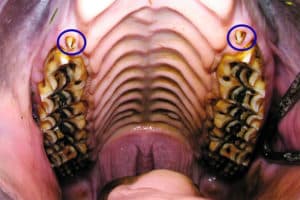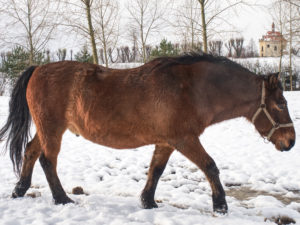Latest News – The Horse

Equine Wolf Teeth
While these teeth usually don’t pose a health risk to the horse, they are often removed in performance horses.

Stumbles and Missteps: What’s Causing Your Horse’s Clumsiness?
Is your horse’s clumsiness a simple matter of long toes and uneven ground, or is a career-limiting condition to blame?

Veterinarians Discuss How to Manage Equine Gastric Ulcers
From when to administer ulcer medication to how to deal with recurring ulcers, veterinarians offer tips and tricks on managing this common horse health condition.

Back to Basics: Dental Anatomy
Your horse’s teeth play a key role in keeping him healthy. Here’s what to know about their structure and function.

Equine Influenza at World Equestrian Center: More Cases Confirmed
World Equestrian Center officials said Feb. 15 that six more horses had tested positive for equine influenza, bringing the total number of confirmed cases to nine.

Will Diatomaceous Earth Kill Worms in Horses?
Learn why this deworming technique doesn’t have an antiparasitic effect in horses.

Top Equine Medicine Studies of 2018
Dr. Rob MacKay shared presented research on ice boots and cryotherapy for laminitic horses, R. equi and insect bit hypersensitivity vaccines, EPM, and more.

What Are ‘Wheat Middlings’ in Horse Feed?
Your horse might be benefiting from wheat middlings in his feed, which can help lower starch levels while maintaining a considerable calorie content.

Keeping Horse Airways Healthy During Winter
Consider these tips to help protect your horse’s breathing zone and most effectively achieve optimal respiratory health this winter.

Senior Horse Health Problems: What to Watch For
Dr. Liz Arbittier encourages owners and caretakers of senior horses to call their vet if they notice any changes in health or behavior, even when it seems minor, to identify issues and begin treatment early. Here’s what to watch for.

Is Muscle Disease Contributing to a Horse’s Poor Performance?
Attention to certain details during exams and careful consideration of test results can help a veterinarian arrive at a diagnosis, making way for an appropriate management.

Vet: Practitioners Need Alternative Methods of Euthanizing Horses
In some scenarios, such as when working in developing countries, veterinarians might not have access to powerful drugs or firearms to euthanize horses, one veterinarian says.

The Evolution of Equids and Dental Work
The modern horse’s dentition results from millions of years of evolution in response to changing food sources and climates. Likewise, how veterinarians treat today’s equine teeth must evolve and improve constantly.

Top Equine Reproduction Studies of 2018
Dr. Regina Turner shares the results of studies on antimicrobial options for metritis, treating blocked oviducts, estrus lengths and pregnancy rates, colic surgery in broodmares, and more.

Working Up Poor Performance in English Sport Horses
Determining why a horse isn’t performing up to expectations can be a time-consuming and tedious process. One veterinarian shares how she approaches these cases.

Study: Endocrine-Disrupting Chemicals Linked to EMS in Horses
Researchers found that endocrine-disrupting chemical accumulation in blood could explain some environmental variance seen in EMS horses, but the precise role they play in EMS development isn’t yet clear.











